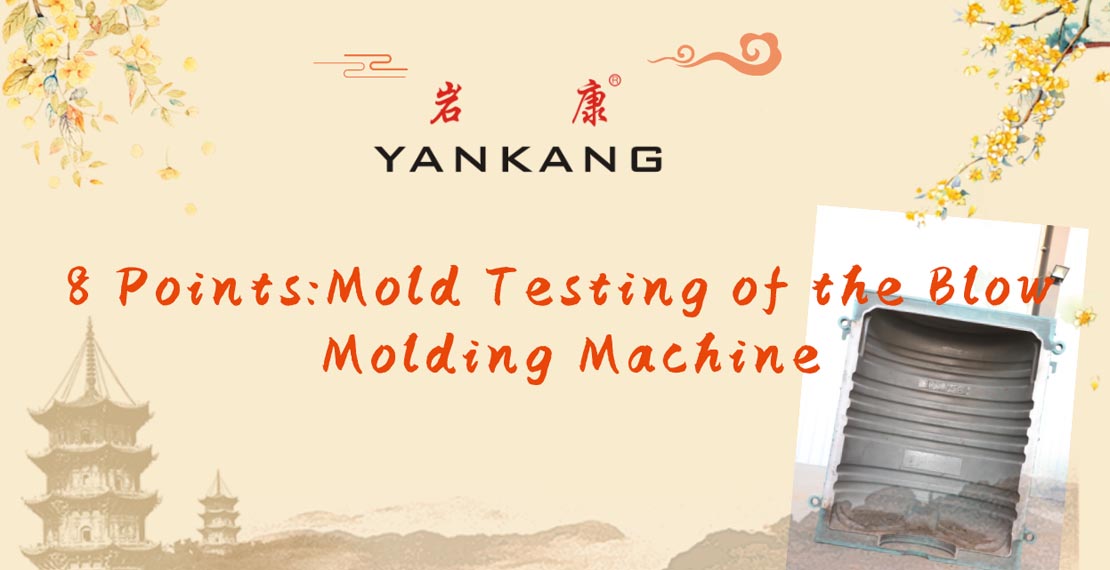It is necessary to do the mold testing before the new mold is blow-molded or when other molds are replaced on the machine. The test result will directly influence the follow-up production of the factory.
Therefore, reasonable operation steps must be followed and useful technical parameters should be recorded in the process of mold testing to facilitate the mass production of products.
Prepare Before The Mold Testing
1. Understand relevant information of the mold:
It is best to obtain the mold design surface, detailed analysis, and the mold technicians to participate in testing.
2. Check the mechanical coordination on the work table first:
Care should be taken for scratches, missing parts and loose, etc. Whether the motion of die – to – slide is true, and whether the water channel and air pipe joints are leaking. If there is a limit to the mold opening should also be marked on the mold.
If the above actions can be done before the die is hung, it can avoid the problem found when the die is hung, and then the time wasted when the die is removed.
3. After determining the proper operation of each part of the mold, select the appropriate injection molding machine, and pay attention to:
(a) what is the maximum injection rate of the blow molding machine?
(b) whether the inner distance of the pull rod is put in the lower mold.
(c) whether the maximum moving stroke of the activity template meets the requirements.
(d) whether other relevant mold testing tools and accessories are ready.
After all, confirmed no problem, the next step is to hang the mold. When hanging, it should be noted that all clamping formwork and die opening should not be taken out before the lock, so as to avoid loose clamping formwork or breakage and mold falling.
After the mold is installed, the mechanical action of each part of the mold should be carefully checked. Then, pay attention to mold closing.
At this point, the pressure of mold closing should be lowered. In manual and low-speed mold closing, pay attention to and listen to whether there are any unsmooth movement and abnormal sound.
4. Increase mold temperature:
According to the properties of raw materials used in the finished product and the size of the mold, choose the appropriate mold temperature control machine to increase the mold temperature to the required temperature during production.
The motion of each part should be examined again after the constant mold temperature increase.
Due to the thermal expansion of steel may cause clamping phenomenon, so we should pay attention to the sliding of each part to avoid the occurrence of tension and vibration.
8 Points For Attention During Mold Testing Of The Blow Molding Machine
1. Check whether the plastics in the barrel are correct and whether they are baked in accordance with the regulations (different results are likely to be obtained for different materials used in mold testing and production).
2. The cleaning of the material pipe should be thorough, so as to prevent the inferior stripping material or mixed material from entering into the mold, because the inferior stripping material and mixed material may jam the mold. Check whether the temperature of the pipe and the mold are suitable for the raw material.
3. Adjust the pressure and injection volume to produce the finished product with satisfactory appearance, but do not run the burrs, especially if there are some mold cavity finished products that have not completely solidified, before adjusting various control conditions, because a slight change in the mold filling rate may cause significant mold filling changes.
4. Wait patiently until the conditions of the machine and mold are stabilized.
5. Measure the continuous sample and record its important dimensions (wait until the sample is cooled to room temperature).
6. When comparing the size of each sample, it should be noted that:
(a) whether the product size is stable.
(b) whether there is a tendency for some sizes to increase or decrease, indicating that machine conditions are still changing, such as poor temperature control or oil pressure control.
(c) whether the size change is within the tolerance range.
7. If the finished product size remains unchanged and the processing conditions are normal, it is necessary to observe whether the quality of each mold is acceptable and its size is within the allowable tolerance. Record the number of holes measured continuously greater than or less than the average value to check the correct size of the mold.
8. Record and analyze the data as the need to modify the mold and production conditions, and as the reference for future mass production.
The above is the preparation before the mold testing and 8 points for attention during mold testing of the blow molding machine.
Before that, Yankang shared with you about 3 ways to clean the head of the blow molding machine(click it).

